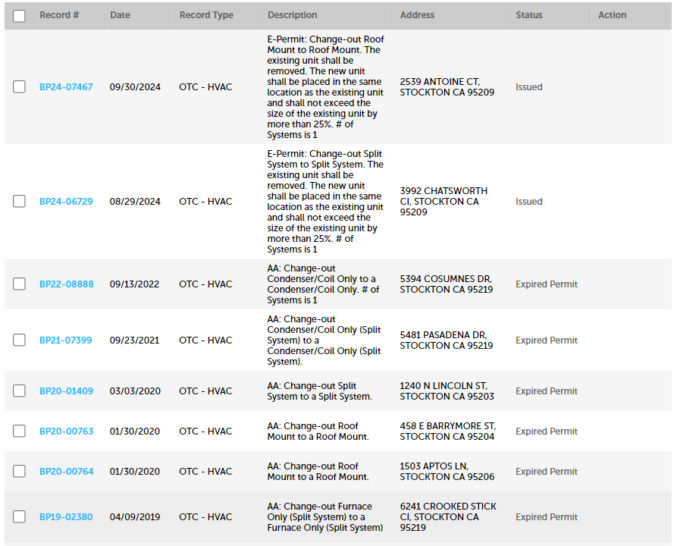Whether you hire a contractor directly or you are assigned one from your home warranty company, it’s important to check a number of things to prevent regret and liabilities. This is especially important when you are assigned a contractor from a warranty company because, speaking from personal experience, contractors who partner with home warranty companies tend to cut corners and behave unprofessionally, as I have experienced this multiple times.

1. Check License Status
Licensed contractors are registered with the state. Check the status of their license on the Contractor State Licensing Board (CSLB)’s website. It should state whether their license is active, suspended, or revoked. If it’s suspended or revoked, they probably didn’t do a good job and it’s illegal for them to do work they were licensed for, so stay away from them. For example, here’s the contractor page for Loves Air and their license status.
https://www.cslb.ca.gov/OnlineServices/CheckLicenseII/LicenseDetail.aspx?LicNum=935212

2. Check Classification, Bond, and Worker’s Comp Info
On the contractor’s page on the CSLB website, you should also check the contractor’s work classification, bond, and worker’s compensation info. Here’s an example for Loves Air.

2. Check Online Reviews
If you are looking for a reputable contractor or are assigned one, read their online reviews, e.g. on websites like Yelp. For example, compare the reviews of Loves Air to T N T Heating & Air, both of which are HVAC contractors. Don’t just look at the number of reviews and the average rating. Read past customer comments as well and how the company responds to customers.

https://www.yelp.com/biz/loves-air-salida
This company got 4.9 stars from 286 reviews. With that type of rating, you probably don’t need to read each customer feedback.

https://www.yelp.com/biz/tnt-heating-and-air-ceres-2
This company got only 2.7 stars from 59 reviews. After reading customer comments, it’s obvious that you should stay very far away from this company. Here’s a response from the owner to a customer’s comment. This tone and choice of words says it all.

Unsurprisingly, this company was chosen by many home warranty companies.
4. Check building permit history
Go to your local government (city / county) website and search for building permits associated with the contractor. For example, T N T Heating & Air serves Modesto, Stockton, and other neighboring cities. If I go to the City of Stockton’s Building Permit website, click on Search Permits, and enter the contractor’s license number, I can see the status of all permits for that contractor. If the permit status is “issued”, that just means the contractor successfully submitted a permit application and can begin work. Once the work is complete, the contractor is supposed to schedule an appointment for the city inspector to inspect the work and either approve the work or disapprove of it with a list of things that need to be fixed. If the inspector approves the work, then status changes to “Finaled”. If the contractor never got the work inspector or approved and a certain period of time passes, then the status changes to “Expired permit”.
In the example below, we see that the contractor has 2 “issued” permits, which are recent, followed by 6 expired permits since 2019. This indicates that the contractor likely repeatedly just got a permit issued but never got an approved inspection, which is illegal. This is a huge red flag. Stay away from such contractors.

5. Get Multiple Quotes
Some contractors will give free quotes. Others will charge a nominal fee. Either way, try to get multiple quotes with a clear breakdown of parts, materials, and labor. Sadly, many contractors don’t like to provide a breakdown because it exposes their outrageous markups. Nevertheless, even if you don’t get a detailed breakdown, at least you’ll know at a high level the main things you’d be getting (or not getting). If a contractor’s quote is outrageous or doesn’t make sense compared to other quotes, then you’ll probably want to skip that contractor.



